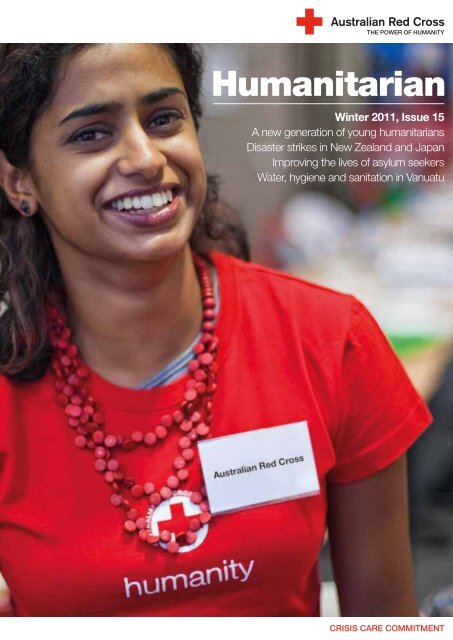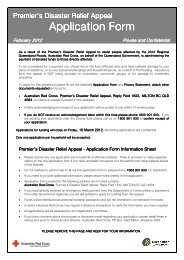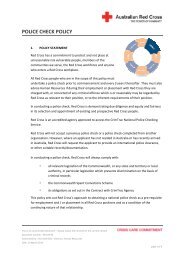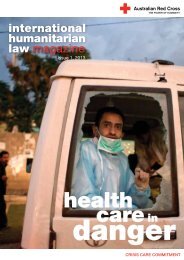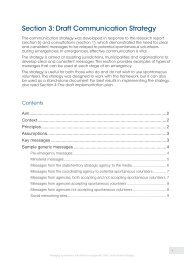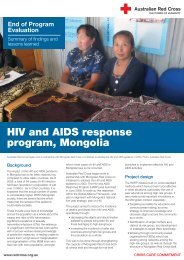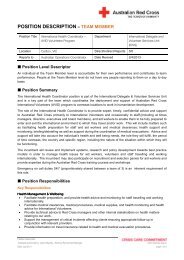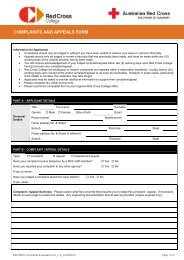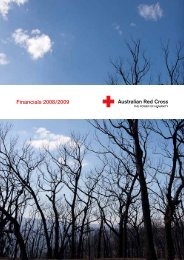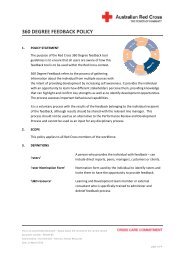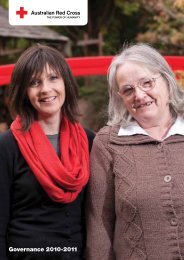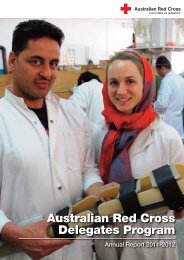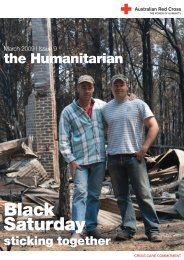Humanitarian - Australian Red Cross
Humanitarian - Australian Red Cross
Humanitarian - Australian Red Cross
Create successful ePaper yourself
Turn your PDF publications into a flip-book with our unique Google optimized e-Paper software.
<strong>Humanitarian</strong><br />
Winter 2011, Issue 15<br />
A new generation of young humanitarians<br />
Disaster strikes in New Zealand and Japan<br />
Improving the lives of asylum seekers<br />
Water, hygiene and sanitation in Vanuatu
Put us where<br />
we’re needed.<br />
Please put us in your Will.<br />
Every gift in every Will, no matter how small or large,<br />
really does make a difference.<br />
Please remember <strong>Red</strong> <strong>Cross</strong> in your Will. Your legacy<br />
will ensure <strong>Red</strong> <strong>Cross</strong> is there for generations to come,<br />
meeting the needs of the most vulnerable people in<br />
our communities.<br />
Contact us for more information by calling<br />
1800 811 700 or email bequests@redcross.org.au.<br />
Relief in times of crisis, care<br />
when it’s needed most and<br />
commitment to building<br />
healthy communities. <strong>Red</strong><br />
<strong>Cross</strong> is there for people in<br />
need, no matter who they are,<br />
no matter where they live.<br />
www.redcross.org.au<br />
CRISIS CARE COMMITMENT
The inside<br />
The first half of this year brought devastation across our country and the region,<br />
and in many communities, the recovery process continues. In the coming months,<br />
and years, <strong>Red</strong> <strong>Cross</strong> will be helping communities in disaster-affected areas<br />
strengthen their capacity to cope with future emergencies. As we work together<br />
to help vulnerable people, we are grateful for the compassion shown by the<br />
<strong>Australian</strong> public through their generous donations to <strong>Red</strong> <strong>Cross</strong>. We would like to<br />
take this opportunity to say thank you.<br />
New Zealand’s city of Christchurch experienced a major earthquake in February which<br />
led to the tragic loss of many lives. Funds raised through the <strong>Australian</strong> <strong>Red</strong> <strong>Cross</strong> NZ<br />
Earthquake Appeal 2011 (now closed) provide affected communities with emergency<br />
relief and recovery assistance, allow <strong>Red</strong> <strong>Cross</strong> to send specialist aid workers to assist<br />
in affected regions, and support the ongoing work of New Zealand <strong>Red</strong> <strong>Cross</strong>.<br />
Then, in March, a 9.0-magnitude earthquake and a seven-metre tsunami hit<br />
northeast Japan. It was one of the most destructive natural disasters Japan has<br />
seen in living memory. To assist with Japan’s emergency relief and long-term<br />
disaster management, <strong>Red</strong> <strong>Cross</strong> launched the Japan and Pacific Disaster Appeal<br />
2011. This appeal is now closed, however you can support our critical ongoing<br />
Disaster Relief and Recovery work at www.redcross.org.au.<br />
This issue of <strong>Humanitarian</strong> highlights the invaluable contribution our young people<br />
make at <strong>Red</strong> <strong>Cross</strong>. At the Youth Engagement Forum held in January, we had the<br />
pleasure of spending three days with 40 inspiring young people, who passionately<br />
discussed humanitarian issues. We are looking forward to further engaging<br />
our young <strong>Red</strong> <strong>Cross</strong> people at all levels of governance, and welcoming a new<br />
generation of young humanitarians to the <strong>Red</strong> <strong>Cross</strong> global network.<br />
Other stories in this edition look at the continuing efforts of <strong>Red</strong> <strong>Cross</strong> in the areas<br />
of international development, international humanitarian law, social inclusion, and<br />
migration support. We also bring you an update on our work with asylum seekers<br />
and the expansion of our Community Detention Program. There is little doubt<br />
that asylum seekers – who have often fled persecution and threats of death, and<br />
who have little or no support in Australia – are among those most in need. As the<br />
lead agency developing the program, <strong>Red</strong> <strong>Cross</strong> is helping to lead the way in this<br />
humanitarian work.<br />
You too can help create positive outcomes for people facing disasters and everyday<br />
challenges by volunteering, giving monthly, leaving a bequest in your Will or making a<br />
one-off donation. For more information about how you can help visit www.redcross.<br />
org.au or call 1800 811 700.<br />
Contents<br />
News in brief<br />
A new generation<br />
of young humanitarians<br />
Ordinary work in<br />
extraordinary places<br />
Improving the lives<br />
of asylum seekers<br />
Devastation in Japan<br />
The disaster that<br />
shook Christchurch<br />
On the road to recovery<br />
Males in Black<br />
Military Police in action<br />
Water, water everywhere<br />
but not enough to drink<br />
AVG joins the fight<br />
against disease<br />
02<br />
04<br />
06<br />
07<br />
08<br />
09<br />
10<br />
11<br />
12<br />
14<br />
16<br />
Robert Tickner<br />
CEO<br />
<strong>Australian</strong> <strong>Red</strong> <strong>Cross</strong><br />
Michael Raper<br />
Director of Services and<br />
International Operations<br />
<strong>Australian</strong> <strong>Red</strong> <strong>Cross</strong><br />
Page 01
News in brief<br />
<strong>Red</strong> <strong>Cross</strong> College –<br />
skills for life<br />
Established late in 2010, <strong>Red</strong> <strong>Cross</strong><br />
College is now the ‘home’ of all our <strong>Red</strong><br />
<strong>Cross</strong> training and educational services.<br />
Bringing together our first aid training,<br />
business services and Registered<br />
Training Organisation businesses under<br />
one roof, <strong>Red</strong> <strong>Cross</strong> is now ideally<br />
placed to ensure our training and<br />
educational services are competitive<br />
in a rapidly changing marketplace.<br />
With a passion for quality training,<br />
the main purpose of the college is to<br />
develop and implement commercial<br />
growth that provides funding for<br />
our ongoing humanitarian work.<br />
Keep an eye out for future editions<br />
of <strong>Humanitarian</strong> which will feature<br />
information on some of the many<br />
training courses being offered. For<br />
more information call 1300 367 428.<br />
Text to donate – an Optus<br />
and <strong>Red</strong> <strong>Cross</strong> initiative<br />
Between 28 March and 11 April,<br />
<strong>Australian</strong> <strong>Red</strong> <strong>Cross</strong> joined forces with<br />
Optus and Be.interactive to raise funds<br />
for the Japan and Pacific Disaster<br />
Appeal 2011, and the New Zealand<br />
Earthquake Appeal 2011. Optus<br />
customers were able to donate $5 to<br />
either appeal simply by texting “Japan”<br />
or “NZ” to 19RELIEF (19735433).<br />
Although these appeals and the number<br />
have now closed, the service will be<br />
made available to support other major<br />
<strong>Red</strong> <strong>Cross</strong> local and international<br />
disaster appeals as needed.<br />
Donors can be assured that contributions<br />
made via SMS are tax deductible. Billpaying<br />
customers are able to claim the<br />
donation from their invoice, and pre-pay<br />
customers can use their online statement<br />
through their My Mobile account<br />
accessible through the Optus website.<br />
You can support our ongoing Disaster<br />
Relief and Recovery work in Australia and<br />
around the world at www.redcross.org.au<br />
or by calling 1800 811 700.<br />
Kingsley, Brooklyn and Les Schultz and Sharnice Munmurrie enjoy<br />
a community picnic and family fun day in the Western <strong>Australian</strong><br />
goldfields town of Coolgardie. Photo: Wayne Quilliam<br />
NAIDOC: Celebrating<br />
history, culture and<br />
achievements<br />
<strong>Red</strong> <strong>Cross</strong> joins communities, other<br />
organisations and governments across<br />
the nation. The week-long event, held<br />
from 3 – 10 July celebrates the history,<br />
culture and achievements of Aboriginal<br />
and Torres Strait Islander peoples.<br />
NAIDOC (National Aboriginal and<br />
Islander Day Observance Committee)<br />
can be traced back to the 1920s and<br />
the emergence of Aboriginal groups<br />
that sought to increase awareness<br />
in the wider community of the status<br />
and treatment of Aboriginal and Torres<br />
Strait Islander peoples.<br />
All <strong>Australian</strong>s are encouraged to<br />
participate and mark the event in their<br />
own way, from flag-raising ceremonies<br />
and Elders’ morning teas, to video<br />
nights and art exhibitions.<br />
Every year has a theme and this year’s<br />
is “Change: the next step is ours”. The<br />
week will be about being responsible<br />
for our future, planning change and<br />
taking action to make it happen.<br />
As part of our Aboriginal and Torres<br />
Strait Islander Strategy, <strong>Red</strong> <strong>Cross</strong><br />
proudly supports NAIDOC Week<br />
and honours this year’s theme.<br />
<strong>Red</strong> <strong>Cross</strong> is committed to working<br />
with communities to help them drive<br />
and lead their own solutions.<br />
This means we are guided by,<br />
and answerable to, the Aboriginal<br />
and Torres Strait Islander peoples,<br />
communities and organisations we<br />
work with.<br />
In celebrating NAIDOC, <strong>Red</strong> <strong>Cross</strong><br />
recognises the incredible work being<br />
done by our more than 100 Aboriginal<br />
and Torres Strait Islander staff in working<br />
with communities to help them achieve<br />
their goals.<br />
In line with our strategy, we will host<br />
and participate in a range of activities<br />
aimed at building our relationships with<br />
Aboriginal and Torres Strait Islander<br />
communities and organisations, as<br />
well as raise staff awareness about<br />
Indigenous affairs.<br />
This year’s NAIDOC celebrations will<br />
culminate with the National Ball, where<br />
the winners of the prestigious NAIDOC<br />
awards will be announced. The awards<br />
include Person of the Year, Artist of the<br />
Year, and Caring for Country Award.<br />
The awards recognise the outstanding<br />
contributions that Aboriginal and<br />
Torres Strait Islander peoples make<br />
to improve the lives of Indigenous<br />
people, to promote Indigenous issues<br />
or the excellence they’ve shown in their<br />
chosen field.<br />
For more information about NAIDOC<br />
Week visit www.naidoc.org.au.<br />
Page 02
Building our capacity to<br />
support offenders and<br />
their families<br />
More than 55 <strong>Red</strong> <strong>Cross</strong> staff and<br />
volunteers gathered from around the<br />
country to participate in the <strong>Red</strong> <strong>Cross</strong><br />
forum on Addressing Offending and<br />
the Impacts of Imprisonment, held in<br />
Melbourne on 2 and 3 March. The<br />
forum presented a melting pot of ideas<br />
from experts in the field, <strong>Red</strong> <strong>Cross</strong><br />
staff and some of the volunteers that<br />
help make our work with offenders and<br />
their families possible.<br />
<strong>Red</strong> <strong>Cross</strong> CEO Robert Tickner<br />
launched the forum with a commitment<br />
from <strong>Red</strong> <strong>Cross</strong> to do more. ‘Make no<br />
mistake, jails are very tough places.<br />
For us to turn our back on people who<br />
are part of the prison population and<br />
their families would be to turn our back<br />
on some of the most vulnerable people<br />
in the country.’ Other highlights of the<br />
forum included a moving address by<br />
Vickie Roach – with her experience<br />
of life in prison and her work as a<br />
prisoner advocate – and Mick Gooda,<br />
Aboriginal and Torres Strait Islander<br />
Social Justice Commissioner with the<br />
<strong>Australian</strong> Human Rights Commission.<br />
‘We need to change the narrative<br />
around offending from punishment<br />
to accountability,’ said Mick.<br />
Blood Donor Week<br />
During 17 – 23 July, the <strong>Australian</strong><br />
<strong>Red</strong> <strong>Cross</strong> Blood Service will<br />
recognise some incredible milestone<br />
donors during National Blood Donor<br />
Week. The week celebrates the<br />
lifesaving gift that our blood and bone<br />
marrow donors provide and aims to<br />
encourage more <strong>Australian</strong>s to roll up<br />
their sleeves.<br />
To raise awareness of blood donation,<br />
various initiatives will be held in each<br />
state, including free blood typing<br />
and dyeing fountains red. You can<br />
help during National Blood Donor<br />
week by donating blood yourself, and<br />
encouraging others to do the same.<br />
If you’re not yet a donor then why not<br />
attend a blood typing event and see if<br />
you’re eligible<br />
The Blood Service appreciates the<br />
support of all <strong>Red</strong> <strong>Cross</strong> staff and<br />
volunteers during this special week and<br />
throughout the year. To find out more<br />
about National Blood Donor Week or<br />
<strong>Australian</strong> <strong>Red</strong> <strong>Cross</strong> Blood Service<br />
visit www.donateblood.com.au or<br />
call 13 14 95.<br />
Sartorial gems to be<br />
found at <strong>Red</strong> <strong>Cross</strong><br />
retail stores<br />
In April, a brand-new <strong>Red</strong> <strong>Cross</strong><br />
retail store opened in Sydney’s East.<br />
Paddington <strong>Red</strong> Threads is a new<br />
fashion concept store, stocking<br />
women’s premium recycled and<br />
new one-off pieces. Shoppers can<br />
find labels including Country Road,<br />
Witchery, Sportsgirl, Portmans and<br />
lucky bargain hunters might also find<br />
Scanlan and Theodore, Calvin Klein,<br />
Leona Edmiston and other highend<br />
brands. The average price for a<br />
garment is $15 and an entire outfit,<br />
including accessories, can be bought<br />
for under $50. Many pieces are brand<br />
new and have never been worn.<br />
The store was designed by<br />
Melbourne’s award-winning Clare<br />
Cousins Architects. The designers<br />
have taken a creative, yet sustainable,<br />
approach to the store design with an<br />
emphasis on using recycled materials<br />
in a new context. You will find a<br />
number of quirky design features in<br />
the store including shoe shelves made<br />
from second-hand books, a window<br />
feature made from rainbow-coloured<br />
cotton reels and patchwork change<br />
room curtains made from recycled<br />
denim jeans.<br />
Other new <strong>Red</strong> Threads stores have<br />
also opened around the country, with<br />
stores now in Gordon in Sydney and<br />
Camberwell and Doncaster East in<br />
Melbourne. <strong>Red</strong> <strong>Cross</strong> Superstores<br />
in Hampstead Gardens in Adelaide<br />
and Mowbray in Launceston will also<br />
be open by July this year. To find out<br />
more, visit www.redcross.org.au.<br />
<strong>Australian</strong> <strong>Red</strong> <strong>Cross</strong> Blood Service<br />
functions will be held across the<br />
country to formally recognise milestone<br />
blood and bone marrow donors. These<br />
functions are the Blood Service’s way<br />
to say thank you to milestone donors<br />
for their ongoing commitment to saving<br />
lives. One of the major milestone<br />
donors we will recognise has donated<br />
850 times.<br />
New <strong>Red</strong> Threads store in Paddington. Photo: <strong>Australian</strong> <strong>Red</strong> <strong>Cross</strong><br />
Page 03
‘You will find an<br />
opportunity that suits<br />
you at <strong>Red</strong> <strong>Cross</strong>,’<br />
Matt Eyles, National<br />
Youth Representative.<br />
<strong>Australian</strong> <strong>Red</strong> <strong>Cross</strong> Young <strong>Humanitarian</strong>s at the National Youth Leadership Forum. Photo: Rodney Dekker<br />
Page 04
A new generation of<br />
young humanitarians<br />
Over the next five<br />
years <strong>Red</strong> <strong>Cross</strong> will<br />
deliver a groundswell<br />
of youth action and<br />
volunteer opportunities<br />
as we welcome a new<br />
generation of young<br />
humanitarians.<br />
‘Young people bring a thirst for<br />
change, innovation and creativity,<br />
adding energy to the way <strong>Red</strong> <strong>Cross</strong><br />
engages with all communities,’<br />
says National Coordinator for Youth<br />
Engagement Simon Rickard.<br />
In 2010, the National Board endorsed<br />
a five-year youth engagement strategy,<br />
identifying that it is a critical component<br />
that will allow <strong>Red</strong> <strong>Cross</strong> to continue to<br />
meet the needs of vulnerable people. ‘For<br />
the <strong>Red</strong> <strong>Cross</strong> humanitarian principles<br />
to resonate loudly in our communities,<br />
nationwide and internationally, we<br />
must reach out to young people – the<br />
people who will define our society<br />
in years to come,’ <strong>Red</strong> <strong>Cross</strong> CEO<br />
Robert Tickner says. ‘We want to<br />
encourage young people, whatever their<br />
background, to define themselves as<br />
young humanitarians and to express<br />
those ideals by contributing to our<br />
organisation’s dedication to tackling<br />
disadvantage.’<br />
The outcomes of the youth engagement<br />
strategy will strengthen the capacity of<br />
<strong>Red</strong> <strong>Cross</strong> to mobilise ready and willing<br />
young people at any one time. This will<br />
provide the organisation with a strong,<br />
nationally united voice on humanitarian<br />
issues. The changing face of <strong>Red</strong> <strong>Cross</strong><br />
will be visible over the next five years,<br />
as the National Youth Engagement<br />
team builds an inclusive, strategic and<br />
coordinated approach to engaging<br />
young people as valuable contributors to<br />
<strong>Red</strong> <strong>Cross</strong>.<br />
Youth leadership is central to the<br />
increasing involvement of young people in<br />
the organisation. There are currently youth<br />
leadership networks across the country,<br />
made up of the National Youth Advisory<br />
Committee (NYAC), and state and territory<br />
Youth Advisory Committees (YACs).<br />
These dedicated young leaders are<br />
paving the way for the new generation of<br />
young humanitarians. ‘The organisation’s<br />
youth leadership networks are an integral<br />
part of the broader youth engagement<br />
strategy,’ Simon explains. ‘Their passion<br />
and skills are invaluable.’<br />
This year, from 27 – 30 January, the<br />
National Youth Engagement Team<br />
organised the inaugural <strong>Red</strong> <strong>Cross</strong><br />
National Youth Leadership Forum at<br />
Humanity Place in Melbourne. The<br />
forum was held in recognition of the<br />
importance and contribution made<br />
by young humanitarians already<br />
undertaking leadership roles at <strong>Red</strong><br />
<strong>Cross</strong>. Over four days, 40 of our<br />
most passionate and engaged young<br />
leaders from across Australia had<br />
access to some of the most influential<br />
people in our organisation today.<br />
Robert Tickner opened the forum with<br />
a keynote speech and Q&A outlining<br />
the guiding principles of <strong>Red</strong> <strong>Cross</strong>,<br />
the current policy-making structures<br />
within the organisation and its plans<br />
for the future. ‘It’s a red-hot passion of<br />
mine to encourage a culture within the<br />
organisation of debate and discussion<br />
about future direction,’ Robert said,<br />
in response to a question from the<br />
audience. ‘It gives us confidence and<br />
comfort to know you can raise any issue<br />
and you will be listened to.’<br />
The forum incorporated a day of<br />
professional development for youth<br />
engagement staff, a day-long plenary<br />
session with presentations from key<br />
<strong>Red</strong> <strong>Cross</strong> staff and culminated with the<br />
NYAC meeting, chaired by the National<br />
Youth Representative Matt Eyles. ‘It<br />
was mind-blowing to see 40 young<br />
people, both staff and volunteers, from<br />
around the country working together and<br />
discussing the ways we can all move<br />
forward,’ Matt says.<br />
Simon agrees: ‘The simple act of getting<br />
so many inspiring young people in the<br />
same room has had an astounding<br />
effect. I think for those staff, members<br />
and volunteers who are at the coalface,<br />
knowing what we are on the brink of –<br />
in terms of youth engagement – gives<br />
them a renewed sense of commitment,<br />
excitement and energy.’<br />
The National Youth Leadership Forum<br />
is just one example of the work being<br />
undertaken to engage young people<br />
at <strong>Red</strong> <strong>Cross</strong>.<br />
There are many opportunities for young<br />
people to get involved in every state and<br />
territory, and with the work of dedicated<br />
staff and volunteers these opportunities<br />
are only going to increase.<br />
Matt believes all young people are<br />
capable of becoming humanitarians.<br />
‘Be open-minded, optimistic about<br />
getting involved and actively look into<br />
the ways you can help,’ he says. ‘Think<br />
about what being a humanitarian<br />
means to you and find out what you’re<br />
passionate about. You will find an<br />
opportunity that suits you at <strong>Red</strong> <strong>Cross</strong>.’<br />
Become a young<br />
humanitarian today<br />
Young people can join us on Facebook,<br />
become a young humanitarian member,<br />
join a <strong>Red</strong> <strong>Cross</strong> University Club, help<br />
organise a blood drive, run a fundraising<br />
event, volunteer or lead programs such<br />
as save-a-mate (SAM) or Y Challenge.<br />
Visit www.redcross.org.au/youth or<br />
contact your <strong>Red</strong> <strong>Cross</strong> state office<br />
on the details on page 17.<br />
Page 05
<strong>Australian</strong> <strong>Red</strong> <strong>Cross</strong> delegate Kirsten Jenkins says goodbye to young<br />
friends at the camp soccer challenge in Haiti organised by <strong>Red</strong> <strong>Cross</strong>.<br />
Photo: José Manuel Jiménez, International Federation <strong>Red</strong> <strong>Cross</strong><br />
‘As a volunteer<br />
within the world’s<br />
largest humanitarian<br />
movement, you will<br />
help mobilise the power<br />
of humanity to reduce<br />
or prevent human<br />
suffering wherever it<br />
might be found,’ Roz<br />
Wollmering, Manager of<br />
International Delegate<br />
and Volunteer Services.<br />
Ordinary work in extraordinary places<br />
<strong>Australian</strong>s can now<br />
volunteer with <strong>Red</strong> <strong>Cross</strong><br />
around the world.<br />
A surf lifeguard, a youth worker and an<br />
HIV/AIDS adviser are among the first<br />
<strong>Australian</strong>s to volunteer with <strong>Australian</strong><br />
<strong>Red</strong> <strong>Cross</strong>, as part of a new program<br />
funded by the Federal Government.<br />
<strong>Australian</strong> Volunteers for International<br />
Development is managed by AusAID in<br />
partnership with <strong>Australian</strong> <strong>Red</strong> <strong>Cross</strong>,<br />
<strong>Australian</strong> Volunteers International and<br />
Austraining International. Through this<br />
program, <strong>Australian</strong> <strong>Red</strong> <strong>Cross</strong> will place<br />
volunteers within <strong>Red</strong> <strong>Cross</strong> societies<br />
and other organisations in Asia, the<br />
Pacific and Africa.<br />
Volunteers will be supported<br />
with airfares, a living allowance,<br />
accommodation, insurance, training and<br />
emergency support. Most assignments<br />
are for 12 months, although they can<br />
range from three months to two years.<br />
International volunteering involves<br />
ordinary work under extraordinary<br />
circumstances, explains Roz<br />
Wollmering, Manager of International<br />
Delegate and Volunteer Services at<br />
<strong>Australian</strong> <strong>Red</strong> <strong>Cross</strong>.<br />
‘On the surface, an international volunteer<br />
role has a lot in common with your day<br />
job in Australia. You complete paperwork,<br />
go to meetings and submit reports.<br />
‘Except that the proposal you write might<br />
help a <strong>Red</strong> <strong>Cross</strong> society get the funds to<br />
carry out relief work in a flood-damaged<br />
town,’ she says.<br />
‘Your morning meeting might be on<br />
a Pacific island with people who are<br />
rebuilding their homes after a cyclone.<br />
The report you write might show how<br />
a group of HIV-positive women are<br />
supporting their families through a small<br />
business scheme.<br />
‘As a volunteer within the world’s<br />
largest humanitarian movement,<br />
you will help mobilise the power of<br />
humanity to reduce or prevent human<br />
suffering wherever it might be found.’<br />
International volunteers supported<br />
by <strong>Red</strong> <strong>Cross</strong> will include health<br />
professionals, financial and human<br />
resource advisers, community<br />
development and social workers,<br />
lawyers, blood specialists, volunteer<br />
managers, and communications<br />
and fundraising professionals. While<br />
they will have diverse backgrounds,<br />
experiences and aspirations, they all<br />
need to be adaptable, resilient, selfaware<br />
and able to work effectively<br />
with people of other cultures.<br />
<strong>Red</strong> <strong>Cross</strong> societies in Asia and the<br />
Pacific have welcomed the program,<br />
and many societies have already<br />
identified assignments for <strong>Australian</strong><br />
volunteers.<br />
These assignments include:<br />
• raising funds to support road safety<br />
programs in Cambodia<br />
• establishing a surf lifesaving<br />
program on a beach in the<br />
Philippines<br />
• creating procedures that enable<br />
<strong>Red</strong> <strong>Cross</strong> societies to quickly<br />
mobilise local volunteers<br />
• developing peer education<br />
programs to reduce HIV<br />
transmission in Kenya<br />
• strengthening financial and human<br />
resource management processes in<br />
Timor-Leste.<br />
Volunteers stand to gain both<br />
professionally and personally through<br />
this program. ‘For some people,<br />
international volunteering is an<br />
opportunity to gain diverse experience,<br />
broaden their skills or fast-track a<br />
career in international development,’<br />
says Roz. ‘For others, it’s a chance to<br />
make a unique personal contribution or<br />
have a life-changing experience.’<br />
If you have what it takes to be an<br />
international volunteer, let us know. Visit<br />
www.redcross.org.au to view the latest<br />
opportunities or call our International<br />
Volunteer program team on (03) 9345<br />
1834 to discuss your options.<br />
Page 06
Critical humanitarian<br />
work – improving the<br />
lives of asylum seekers<br />
Hanna Kopel, a <strong>Red</strong> <strong>Cross</strong> Community Detention<br />
Program caseworker. Photo: <strong>Australian</strong> <strong>Red</strong> <strong>Cross</strong><br />
The <strong>Australian</strong> Government<br />
announced on 18 October 2010 that<br />
community detention options would<br />
be expanded to enable significant<br />
numbers of vulnerable families and<br />
unaccompanied minors to be moved<br />
from immigration detention facilities<br />
into communities.<br />
<strong>Red</strong> <strong>Cross</strong> agreed to act as the lead<br />
agency in care arrangements for<br />
these groups. Eight months later, with<br />
support from partner organisations,<br />
we are coordinating the delivery of the<br />
program across Australia.<br />
The primary purpose of the Community<br />
Detention Program is to provide holistic<br />
care for families with children and<br />
unaccompanied minors while their<br />
visa status is being resolved. This is<br />
achieved through community detention<br />
arrangements instead of detention in<br />
remote settings or other inappropriate<br />
facilities such as secured motels. This is a<br />
more humane and successful approach<br />
to caring for vulnerable people and will<br />
result in improved health and wellbeing<br />
outcomes.<br />
Hanna Kopel is a <strong>Red</strong> <strong>Cross</strong><br />
caseworker working for the Community<br />
Detention Program. She looks after<br />
more than 15 clients, from different<br />
backgrounds, and various needs in<br />
the community. ‘There are people who<br />
have experienced torture and trauma.<br />
That’s the basis of their refugee<br />
application and why they’ve come to<br />
Australia,’ Hanna says. ‘Then there are<br />
clients who want to learn everything<br />
overnight. They’re eager to learn<br />
English, how to get around on public<br />
transport, how to get to the beach and<br />
become familiar with their environment.<br />
They want to be independent.’<br />
<strong>Red</strong> <strong>Cross</strong> has a responsibility to help the<br />
most vulnerable people in society. There<br />
is little doubt that asylum seekers – who<br />
have often fled persecution and threats<br />
of death, and who have little or no family<br />
support in Australia – are among those<br />
most in need. Through the program,<br />
housing and health services are provided<br />
and children are enrolled in school. <strong>Red</strong><br />
<strong>Cross</strong> also helps asylum seekers gain<br />
access to community language classes,<br />
emergency services, social networks and<br />
other agencies. Caseworkers like Hanna<br />
have seen firsthand how her clients’<br />
quality of life has improved since being<br />
placed in community detention. ‘Our<br />
clients have a sense of excitement about<br />
their new environment.’<br />
Hanna’s clients face day-to-day<br />
challenges, too. ‘People often find the<br />
first few days overwhelming,’ she says.<br />
‘There is a transition between being<br />
placed in a detention centre to living in<br />
a community.’ While the people placed<br />
in community detention are waiting for<br />
the outcome of their visa application,<br />
<strong>Red</strong> <strong>Cross</strong> caseworkers like Hanna<br />
are there to help. ‘The families and<br />
children in our program are incredibly<br />
resilient, but it is difficult for them to<br />
start the recovery process while they<br />
are waiting for their immigration status<br />
to be resolved.’ As more clients are<br />
being placed in community detention,<br />
<strong>Red</strong> <strong>Cross</strong> is sending more volunteers<br />
and caseworkers to help them become<br />
familiar with the areas they are living in.<br />
‘Clients often get a little bored as they<br />
are not allowed to work.<br />
The work of volunteers is a great way to<br />
help them engage with their community,<br />
especially to help them improve their<br />
English,’ Hanna says. <strong>Red</strong> <strong>Cross</strong> is also<br />
working to build positive public views<br />
of asylum seekers in Australia. ‘There<br />
is this misconception that the people<br />
in our program have done something<br />
wrong. They have done nothing wrong,’<br />
she says. ‘They are entitled to have their<br />
basic human rights addressed.’<br />
<strong>Red</strong> <strong>Cross</strong> will continue to support<br />
asylum seekers in this critical<br />
humanitarian response. Hanna says,<br />
‘I admire that <strong>Red</strong> <strong>Cross</strong> took on this<br />
huge task, and I’m proud to be a<br />
part of this work that is making a real<br />
difference in vulnerable people’s lives.’<br />
The Community Detention program<br />
is fully funded by the <strong>Australian</strong><br />
Government through the Department<br />
of Immigration and Citizenship, which<br />
is responsible for the implementation<br />
and expansion of community<br />
detention. The Minister for Immigration<br />
and Citizenship personally decides<br />
who can live in community detention.<br />
How you can help<br />
<strong>Red</strong> <strong>Cross</strong> relies on committed<br />
volunteers. You can support those in<br />
the Community Detention program<br />
by volunteering to help them better<br />
engage with their new community.<br />
Visit www.redcross.org.au or call<br />
1800 811 700 to get involved.<br />
Page 07
Kimie Yamada visits the apartment building where she once lived with her two<br />
young daughters. Their apartment was destroyed by the tsunami. Photo: IFRC<br />
Devastation in Japan<br />
On 11 March, one of the<br />
largest earthquakes and<br />
most powerful tsunamis<br />
in recent history wiped<br />
out towns and villages<br />
in north-east Japan.<br />
The largest wave reached approximately<br />
38 metres high. More than 27,000<br />
people were killed or are missing and<br />
thousands more were injured.<br />
Many affected residents like Kimie<br />
Yamada are struggling to make sense of<br />
the devastation, yet there is still a strong<br />
will to rebuild their communities.<br />
Kimie Yamada points at the small<br />
apartment building that just last month<br />
she shared with her two daughters.<br />
Today, like many other structures in<br />
Rikuzentakata, only the shell remains<br />
following the tsunami that swept<br />
through it on 11 March. This coastal<br />
city of 30,000 people was decimated<br />
by the tsunami. The only signs of<br />
houses that once neighboured Kimie’s<br />
apartment building are the foundations<br />
they once stood on.<br />
Since that day, Kimie and her<br />
daughters have been living with her<br />
parents. It’s crowded and Kimie feels<br />
she is burdening them, but that is<br />
about to change. The family has been<br />
selected as one of the first to receive a<br />
newly built pre-fabricated house. The<br />
government is constructing 70,000<br />
of them across the three hardesthit<br />
prefectures of Iwate, Miyagi and<br />
Fukushima. The Japanese <strong>Red</strong> <strong>Cross</strong><br />
Society, using funds donated from<br />
overseas, is fitting each of these prefabricated<br />
houses with a package<br />
of six appliances, a project that will<br />
benefit more than 280,000 people.<br />
‘We have been receiving donations<br />
from other <strong>Red</strong> <strong>Cross</strong> and <strong>Red</strong><br />
Crescent societies around the world,’<br />
says Atsuhiko Hata, the Japanese<br />
<strong>Red</strong> <strong>Cross</strong> Society’s public relations<br />
director. ‘We wanted to use these<br />
donations to meet the needs of<br />
tsunami survivors. The six appliances<br />
we are providing are the bare minimum<br />
needed to help them start a new life.’<br />
The appliance package includes<br />
a refrigerator, washing machine,<br />
microwave, rice cooker, hot water<br />
dispenser, and a television; items that<br />
help make a house a home, and, in the<br />
case of the television, a valuable tool<br />
for providing information before, during<br />
and after disasters.<br />
A life-changing disaster<br />
A senior international <strong>Red</strong> <strong>Cross</strong> team<br />
undertook a successful assignment<br />
in Japan, not long after the tsunami.<br />
They were assisting Japanese <strong>Red</strong><br />
<strong>Cross</strong> to develop a comprehensive<br />
plan for the response.<br />
When Head of International<br />
Programs at <strong>Australian</strong> <strong>Red</strong> <strong>Cross</strong>,<br />
Donna McSkimming, arrived at the<br />
earthquake area, the devastation was<br />
shocking. ‘Essentially the scenes that<br />
we saw were just piles of tsunami<br />
debris that were bits of houses,<br />
reduced to splinters. Cars were just<br />
tossed around like toys hanging off<br />
fences and buildings,’ Donna says.<br />
The Japanese response was impressive<br />
says Donna. ‘It was incomprehensible to<br />
imagine how the devastation could be<br />
cleaned up and restored yet everywhere<br />
we went we saw evidence of that.’<br />
Schools are being opened and <strong>Red</strong><br />
<strong>Cross</strong> is working towards restoring<br />
normal life for the hundreds of thousands<br />
of people affected.<br />
There is still a terrible tragedy of the more<br />
than 12,000 people who are still missing,<br />
Donna says. ‘In order to bring some<br />
comfort and surety to the family, it is very<br />
important to find out as much as we can<br />
about individuals not yet accounted for.’<br />
The <strong>Australian</strong> fundraising effort has<br />
been inspiring for Japanese people,<br />
Donna adds with a smile. ‘This is the<br />
worst disaster to hit Japan since World<br />
War II. And as one of my Japanese<br />
colleagues said, “it will change<br />
us forever in ways we can’t even<br />
anticipate at this point in time”.’<br />
How you can help<br />
The New Zealand Earthquake Appeal<br />
2011, run by <strong>Australian</strong> <strong>Red</strong> <strong>Cross</strong><br />
is now closed. You can continue to<br />
support our work by donating to our<br />
ongoing Disaster Relief and Recovery<br />
work in Australia. To make a donation,<br />
visit www.redcross.org.au or call<br />
1800 811 700.<br />
– Kathy Mueller, IFRC<br />
Page 08
<strong>Australian</strong> aid-worker Kristen Proud in<br />
the busy staff area of the Christchurch<br />
<strong>Red</strong> <strong>Cross</strong> headquarters in Birmingham<br />
Drive. Photo: David Wethey<br />
The disaster that shook Christchurch<br />
On 22 February, hundreds of people<br />
were injured and 181 were killed when<br />
a hugely destructive earthquake struck<br />
Christchurch and surrounding areas.<br />
Many thousands of homes were also<br />
damaged or destroyed. <strong>Red</strong> <strong>Cross</strong><br />
responded by providing relief and<br />
recovery centres, personal assistance<br />
through outreach and reconnecting<br />
families as well as vital supplies such as<br />
food and water to thousands of people.<br />
Keeping above<br />
the rubble<br />
For survivors of the earthquake, there<br />
was also a heavy psychological toll.<br />
<strong>Red</strong> <strong>Cross</strong> responded immediately,<br />
although many of those assisting<br />
were dealing with their own trauma.<br />
Psychological support was offered to<br />
<strong>Red</strong> <strong>Cross</strong> workers to make sure they<br />
could carry out their vital relief work.<br />
‘I thought someone had backed into<br />
my truck,’ says Christchurch local Paul<br />
Davenport, also known affectionately<br />
as ‘Kilo’. ‘I’m a milkman during the day.<br />
I was taking empty milk crates off my<br />
truck when the earthquake started. I<br />
saw the landing dock and the truck<br />
separate and slam back together<br />
again and then it was all on.’ Paul<br />
watched from his violently rocking van<br />
as hundreds of milk crates cascaded<br />
all over the factory. His first thought<br />
went to his wife over the other side of<br />
the city. Paul’s second thought was of<br />
where he would need to be that night;<br />
he is an emergency response team<br />
member with <strong>Red</strong> <strong>Cross</strong>.<br />
A few days after the earthquake,<br />
<strong>Australian</strong> aid-worker Kristen Proud<br />
was sent to Christchurch to work with<br />
New Zealand <strong>Red</strong> <strong>Cross</strong> staff and<br />
volunteers on psychosocial support<br />
– psychological support for people<br />
caught up in the disaster. ‘The first<br />
thing that struck me when I got off<br />
the plane was how busy the airport<br />
was with people who were leaving.<br />
Lots of people were sitting and crying<br />
and obviously very impacted by the<br />
earthquake,’ she says.<br />
Paul first found himself not coping at<br />
home a few days after the disaster.<br />
‘We were all getting very tired,’ he<br />
remembers. ‘You try to go home and<br />
you’ve got aftershocks happening<br />
all the time, it’s not normal. I was put<br />
in charge of one site and I got down<br />
there and I was all ready to go. I had<br />
my kit and I was going to get changed<br />
in the van and then: I forgot my boots.<br />
I forgot my safety boots. It was just a<br />
little thing. It completely threw me and<br />
I had a meltdown, panic attack. I got<br />
back to base and told them, “I can’t be<br />
here I’ve got to get out of here”. I made<br />
my way back to the <strong>Red</strong> <strong>Cross</strong> base<br />
and talked to Kristen, which was really<br />
helpful. It was really nice to know that<br />
there was help there if you needed it.’<br />
Essential to the recovery process<br />
is finding support, whether through<br />
friends, family or someone to talk to.<br />
‘Some individuals needed more pure<br />
counselling support and then others<br />
just needed someone to debrief with –<br />
have a bit of a chat – at the end of their<br />
day,’ Kristen says.<br />
How you can help<br />
The New Zealand Earthquake Appeal<br />
2011, run by <strong>Australian</strong> <strong>Red</strong> <strong>Cross</strong><br />
is now closed. You can support our<br />
ongoing Disaster Relief and Recovery<br />
work, helping our Emergency Services<br />
teams as they prepare, respond and<br />
provide relief to communities during<br />
disasters. To make a donation, visit<br />
www.redcross.org.au or call 1800 811 700.<br />
– Laura McKay and Antony Balmain,<br />
<strong>Australian</strong> <strong>Red</strong> <strong>Cross</strong>.<br />
Page 09
On the road to recovery<br />
Residents begin to rebuild in Tully. Photo: <strong>Australian</strong> <strong>Red</strong> <strong>Cross</strong><br />
In early 2011, Australia<br />
faced four major<br />
disasters in just 40 days.<br />
Following this disaster<br />
season, communities are<br />
continuing to do it tough.<br />
Slowly, homes are being rebuilt around<br />
the country. While the physical task of<br />
rebuilding is taking place, communities<br />
and individuals are piecing their lives<br />
back together.<br />
While the worst of the current disasters<br />
is over, the road to recovery is long<br />
and requires committed support from<br />
agencies across the nation, including<br />
<strong>Red</strong> <strong>Cross</strong>.<br />
‘Recovery’ refers to programs that<br />
go beyond immediate relief, assisting<br />
affected people to rebuild their homes,<br />
lives and services. It is about more than<br />
bricks and mortar. Recovery is about<br />
supporting the psychological wellbeing<br />
of those affected and their livelihoods. It<br />
is also about communities working out<br />
how to re-establish the way they function<br />
and be more resilient to future disasters.<br />
Recovery activities vary and are<br />
carried out after close consultation<br />
with community members. ‘Recovery<br />
is one of the core outcomes of the<br />
emergency services strategy,’ says<br />
John Richardson, National Coordinator<br />
of Strategic Development, Emergency<br />
Services. John has been leading <strong>Red</strong><br />
<strong>Cross</strong> national recovery work over<br />
recent months. He says recovery<br />
activities vary, depending on the<br />
emotional, economic and physical<br />
needs of the people in affected areas<br />
and the severity of the emergency.<br />
For instance, they might start new<br />
groups to get people talking to help<br />
cope with the trauma, or support people<br />
with practical assistance and referral<br />
to other support agencies. The impact<br />
of emergencies can have long lasting,<br />
diverse and profound consequences on<br />
communities. There is plenty of evidence<br />
that recovery takes many years, says<br />
John. ‘Think about how long it takes to<br />
build a home or renovation, from start to<br />
finish. Then add the stress of having lost<br />
everything, maybe even family members,<br />
dislocated from family, friends, networks.<br />
This is what people have to deal with in<br />
the aftermath of the disaster.’<br />
Recovery activities currently being<br />
undertaken by <strong>Red</strong> <strong>Cross</strong> include<br />
personal and psychological support<br />
like door-to-door outreach to check<br />
in with people in affected areas.<br />
Community support has also<br />
been a major focus. <strong>Red</strong> <strong>Cross</strong><br />
has forged new relationships with<br />
local governments and community<br />
organisations in areas affected by the<br />
disasters, including Toowoomba and<br />
the Lockyer Valley.<br />
The <strong>Australian</strong> <strong>Red</strong> <strong>Cross</strong> recovery<br />
plan is heavily influenced by the<br />
International Federation of <strong>Red</strong> <strong>Cross</strong>.<br />
However, due to the succession of<br />
disasters in recent years, the <strong>Red</strong><br />
<strong>Cross</strong> emergency services team has<br />
tailored and strengthened its recovery<br />
responses. ‘We hold a significant<br />
amount of recovery experience in the<br />
<strong>Australian</strong> context,’ John says.<br />
Following the 2009 Victorian<br />
bushfires, <strong>Red</strong> <strong>Cross</strong> now has a better<br />
understanding of what communities<br />
need, whether they are recovering<br />
from floods, fires, or cyclones. ‘Fire is<br />
different to flood because it’s fastmoving<br />
and unpredictable,’ John says,<br />
reflecting on the bushfires. ‘Due to the<br />
extreme conditions, we ended up with<br />
significant loss of life far greater than<br />
what we’ve seen in living memory. We<br />
had townships that were completely<br />
destroyed, and others which had<br />
significant property loss.’<br />
The ultimate goal of <strong>Red</strong> <strong>Cross</strong><br />
recovery activities is to strengthen<br />
affected communities’ capacity to<br />
cope with future disasters if and<br />
when they strike again. From John’s<br />
experience, after an emergency,<br />
people become much more aware<br />
of what they need to do to protect<br />
themselves from another disaster.<br />
‘Usually the call comes directly from<br />
the community, and they say, “We<br />
don’t want this to happen again.<br />
What can we do”’<br />
REDiPlan is the <strong>Red</strong> <strong>Cross</strong> four-step<br />
emergency preparedness plan available<br />
to all communities in disaster-affected<br />
and disaster-prone areas. The four<br />
steps are: be informed, make a plan,<br />
get an emergency kit and know your<br />
neighbours. ‘The beauty of REDiPlan<br />
is that it is so flexible. The message is<br />
there and consistent, and based on<br />
our experience we can tailor it for their<br />
different circumstances.’<br />
For the next few years, <strong>Red</strong> <strong>Cross</strong> staff<br />
and volunteers will be on the ground,<br />
knocking on people’s doors, helping<br />
rebuild lives across the nation. You can<br />
help by donating monthly or volunteering.<br />
To find out how call 1800 811 700 or visit<br />
www.redcross.org.au.<br />
Page 10
Males in Black Vice-Chair Robert Taylor and his family. Photo: Wayne Quilliam Photography<br />
In Port Augusta,<br />
the Males in Black<br />
program, which has<br />
been operating since<br />
1989, is supporting<br />
young Aboriginal<br />
fathers in a oneon-one<br />
mentoring<br />
program supported<br />
by <strong>Red</strong> <strong>Cross</strong>.<br />
Males in Black: supporting Aboriginal fathers<br />
Males in Black grew out of a committee<br />
formed by the local Aboriginal<br />
community following the premature<br />
deaths of two young men. The<br />
committee members wanted to improve<br />
Aboriginal men’s social and emotional<br />
wellbeing, and issues such as the impact<br />
of the stolen generation and exclusion<br />
by the mainstream population of the<br />
town, and realised there was a lack of<br />
programs for local men.<br />
Robert Taylor, Males in Black Vice-<br />
Chair and a born-and-bred local, says<br />
that he was an example of the type of<br />
client that the program helps. ‘I was<br />
about to become a father but there’s<br />
no manuscript on being a father, which<br />
some of us fathers do need. I was<br />
slowly coming down from alcohol and<br />
drugs and hanging around the wrong<br />
people. Basically, I had to make some<br />
adjustments to my life so that I could<br />
be a positive role model for my son<br />
and my daughters,’ Robert says.<br />
Almost 20 per cent of the Port Augusta<br />
population is Aboriginal, compared<br />
with the Australia-wide average of 2.5<br />
per cent. The Aboriginal population is<br />
also much younger, with an average<br />
age of 23 years, compared with 36<br />
years for non-Aboriginal people.<br />
Aboriginal and Torres Strait Islander<br />
peoples in Port Augusta face poverty,<br />
discrimination, remoteness and a lack<br />
of opportunities.<br />
While health programs have focused<br />
on strengthening the bonds between<br />
mothers and their babies, the benefits<br />
of programs supporting fathers<br />
are increasingly being recognised.<br />
There have also been low rates of<br />
participation of Aboriginal fathers<br />
in family programs. <strong>Red</strong> <strong>Cross</strong> has<br />
recognised this need and supports<br />
the work of Males in Black by<br />
providing premises and services, such<br />
as phones, so that the group can<br />
continue to operate.<br />
‘If there wasn’t a program like Males<br />
in Black here in Port Augusta, we<br />
would be skating on thin ice with a<br />
lot of youth into drugs and alcohol,<br />
pregnancy, in and out of the courts<br />
and jails,’ says Robert.<br />
He says the group is getting a lot of<br />
referrals of troubled young fathers<br />
and that at any one time, the program<br />
helps between 10 and 15 young men<br />
to be better fathers and to break the<br />
cycles of unemployment, offending,<br />
incarceration and addiction.<br />
Robert says that Males in Black<br />
has been successful because it has<br />
gained the trust of the fathers and has<br />
provided one-on-one support from<br />
Aboriginal men who are voluntary role<br />
models and local community members.<br />
The program often conducts its activities<br />
outside work hours to make it possible<br />
for their volunteers and young men to<br />
come together.<br />
Despite his wayward beginnings, being<br />
involved in the Young Dads Project<br />
came naturally to Robert whose<br />
traditional name is Ynimmy, meaning<br />
‘old man’. ‘As a young boy, people<br />
told me that that name is not to say<br />
that you’re an old man, it’s more of<br />
a wise thing, where they can tell if<br />
you’re going to be a wise person in the<br />
future. I’ve had that understanding in<br />
my head since I was a child. I wanted<br />
to be a leader. I want to be that guy<br />
that basically helps my family. I’ve had<br />
all these obstacles, drugs, alcohol,<br />
brothers, mates but I’ve now cemented<br />
myself in a good position as a positive<br />
role model,’ he says. This will have a<br />
big impact in Robert’s local community<br />
and he says that while he has three<br />
children of his own, his kinship<br />
obligations mean he has shared<br />
responsibility for up to 30 children.<br />
Robert says the program teaches<br />
young men to organise camps and<br />
social events, and teach skills like first<br />
aid, budgeting, hunting and gathering<br />
for elders as well as being involved in<br />
things like play groups for young dads<br />
particularly with children up to five<br />
years of age.<br />
Males in Black workshops and<br />
community outreach programs for young<br />
Aboriginal dads aim to build leadership<br />
skills, promote community development,<br />
build stronger families, teach culture and<br />
foster better parenting for children.<br />
The support of <strong>Red</strong> <strong>Cross</strong> for the<br />
project highlights key principles of our<br />
Aboriginal and Torres Strait Islander<br />
strategy, adopted in July 2009, to<br />
work in respectful partnerships<br />
with Aboriginal and Torres Strait<br />
Islander communities by supporting<br />
community-led initiatives.<br />
Page 11
Military Police and IHL<br />
<strong>Australian</strong> soldiers in Afghanistan.<br />
Photo: ADF/LT Aaron Oldaker<br />
When we think of Military<br />
Police (MPs) our image<br />
tends to come from old<br />
war movies. MPs are the<br />
law enforcers. They arrive<br />
in jeeps when soldiers on<br />
R&R (rest and relaxation)<br />
have had too much of<br />
a good time and throw<br />
them into ‘the clink’! Of<br />
course this is a caricature.<br />
MPs do ensure that troops adhere<br />
to both military and civilian laws,<br />
but not in this simplistic way – and<br />
they do much more as well. Their<br />
role covers four key areas: law<br />
enforcement; security; military mobility<br />
and manoeuvring support; as well as<br />
internment and detention.<br />
In today’s conflicts, such as in<br />
Afghanistan, MPs are responsible for the<br />
internment and detention of captured<br />
persons, including their processing upon<br />
capture and treatment while detained.<br />
In terms of International <strong>Humanitarian</strong><br />
Law (IHL), this is where the work of MPs<br />
and the Third Geneva Convention for<br />
prisoners of war (and related laws) most<br />
closely converge.<br />
During 2010 and 2011, our IHL team<br />
has had several opportunities to<br />
interact with MPs from the <strong>Australian</strong><br />
1st Military Police Battalion. Not only<br />
did a group of MPs attend our four-day<br />
<strong>Australian</strong> Defence Force Instructors’<br />
Course in Melbourne, but in January<br />
<strong>Red</strong> <strong>Cross</strong> staff Pete Giugni (NSW) and<br />
Eve Massingham (QLD) joined MPs in<br />
the field, on a practical training exercise<br />
an hour’s drive from Townsville.<br />
The ADF had invited Pete and Eve<br />
to play the roles of members of the<br />
International Committee of the <strong>Red</strong><br />
<strong>Cross</strong> (ICRC). While the ICRC often<br />
conducts these exercises, in this<br />
instance <strong>Australian</strong> <strong>Red</strong> <strong>Cross</strong> stood<br />
in, role-playing detention visits that the<br />
ICRC conducts across the world.<br />
Two things struck our duo. The<br />
MPs were simulating their mission in<br />
Afghanistan, but still, when the call to<br />
prayer sounded five times a day and<br />
spasmodic blasts were heard, Line<br />
Creek village with its old country pub<br />
and corner store, seemed rather a quaint<br />
scene for such action. For the MPs the<br />
exercise was no lark. Carried out very<br />
seriously, the soldiers acted exactly as<br />
they would in the theatre of war.<br />
Pete and Eve’s second impression<br />
was the use of acronyms – initials<br />
for everything, thrown around at a<br />
bewildering rate. The exercise was<br />
in the MRA (Mission Rehearsal Area<br />
Activity) practising for a deployment to<br />
Page 12
TK (Tarin Kowt) in the DMT (Detention<br />
Management Team) managing the ISA<br />
(Initial Screening Area) and handling<br />
all roles apart from TQ (Tactical<br />
Questioning). How does a civilian<br />
keep up<br />
In real life, when an ICRC protection<br />
delegate visits detainees, there are<br />
strict standard procedures. On arrival,<br />
the delegate meets authorities and<br />
addresses issues of concern, and<br />
discusses how the visit will take place.<br />
ICRC will then check or establish<br />
a register of all inmates, conduct<br />
interviews with detainees without<br />
any witness, offer the opportunity<br />
of a <strong>Red</strong> <strong>Cross</strong> family message and<br />
conduct a thorough inspection of<br />
every part of the facility. The objective<br />
is to monitor conditions, prevent<br />
ill-treatment or disappearances and<br />
assist authorities in meeting their legal<br />
obligations. Independent reporting<br />
is provided to the prison authorities<br />
and their ministerial hierarchy and<br />
remains confidential. While ICRC visits<br />
– repeated, not one-off – in no way<br />
guarantee all is well, they do show<br />
the detaining authorities’ willingness<br />
to work with independent monitors<br />
and show prisoners that they are not<br />
forgotten by the outside world.<br />
In a typical year, ICRC staff visit as<br />
many as 500,000 detainees in more<br />
than 60 countries. Today, because<br />
most detainees are not prisoners-ofwar<br />
in strict legal terms (and different<br />
legal protections apply in internal armed<br />
conflict from international armed conflict),<br />
the ICRC, in agreement with authorities,<br />
visits a much broader range of people<br />
detained as a result of conflict.<br />
How did the inspection of the pretend<br />
ADF facilities go Fortunately, very well.<br />
On the arrival of our team, an interpreter<br />
in civilian clothes was provided by the<br />
ADF and the visit began.<br />
The purpose of ICRC inspections is not<br />
adversarial. Rather, observations made<br />
are the starting point for discussions<br />
aimed at encouraging authorities to<br />
confirm or raise standards, if necessary,<br />
towards those set out in the law.<br />
During the tour of facilities the ICRC<br />
and the MPs examined and discussed<br />
various points – the size of cells and<br />
exercise yards, the requirement of<br />
organising family visits, even for socalled<br />
‘high value’ detainees, sensitivity<br />
to local cultural practices and the<br />
‘comfort’ of detainees being balanced<br />
against security concerns. This to-andfro<br />
negotiation is typical of the way the<br />
system works.<br />
What an experience – to travel with the<br />
ADF and see them in action, observing<br />
the IHL they had been taught, first and<br />
foremost by the Army’s own Command<br />
and Legal Officers, and supported by<br />
<strong>Red</strong> <strong>Cross</strong>.<br />
Yet the trip had its challenges too. Pete<br />
and Eve lived under tough conditions<br />
– coping with tropical humidity, and<br />
sleeping in the open air under the<br />
requisite mosquito nets. And, for a<br />
little extra spice, the exercise had<br />
to be abandoned, and everyone<br />
evacuated twice, just before Cyclone<br />
Anthony was expected and again<br />
when Cyclone Yasi struck. No rest for<br />
the MPs though. Post Yasi they were<br />
re-assigned, supporting ADF recovery<br />
efforts from Townsville to Tully.<br />
Between January and May 2010, the<br />
ICRC carried out an astounding number<br />
of visits in the Afghanistan conflict.<br />
Some 14,000 detainees were reached,<br />
including those held by the Afghan<br />
authorities, US forces, the NATO-led<br />
International Security Assistance Force<br />
and others in the armed opposition.<br />
The ICRC has had a delegation in Kabul<br />
since 1987. But Uruzgan province – a<br />
name now familiar to <strong>Australian</strong>s – has<br />
been a difficult area for the ICRC since a<br />
tragedy in 2003. An El Salvadorian ICRC<br />
water engineer, Riccardo Munguia, was<br />
deliberately targeted, pulled from his car<br />
and killed. Almost all ICRC operations in<br />
the region were suspended, though they<br />
were supported from Kandahar.<br />
An ICRC office was re-opened in<br />
Uruzgan in 2009. It is from that base<br />
that the ICRC now maintains regular<br />
contacts with the ADF base and<br />
detention facility. In other words when<br />
‘our’ Townsville MPs arrive at their<br />
Afghanistan posts they will see the<br />
ICRC practices on which they were<br />
trained replicated exactly. Familiarity<br />
and consistency of approach can only<br />
lead to greater IHL adherence.<br />
– Bev Patterson, <strong>Australian</strong> <strong>Red</strong> <strong>Cross</strong><br />
About The Royal <strong>Australian</strong><br />
Corps of Military Police<br />
The Royal <strong>Australian</strong> Corps of Military<br />
Police is a small highly trained<br />
and professional Corps providing<br />
command support and police support<br />
to the Army and the <strong>Australian</strong> Defence<br />
Force in peace, crisis and conflict on<br />
any operation, anywhere in the world.<br />
Their role covers four key areas: law<br />
enforcement; security; mobility and<br />
manoeuvring support; and internment<br />
and detention. One Military Police<br />
Battalion is the Army’s deployable<br />
Force Element of this Corps.<br />
About the ICRC<br />
The International Committee of the<br />
<strong>Red</strong> <strong>Cross</strong> (ICRC) is an impartial,<br />
neutral and independent organisation<br />
whose exclusively humanitarian<br />
mission is to protect the lives and<br />
dignity of victims of armed conflict<br />
and other situations of violence and<br />
to provide them with assistance.<br />
Page 13
Water, water everywhere,<br />
but not enough to drink<br />
Each year, many families<br />
on the Vanuatu island<br />
of Ambrym run out of<br />
fresh water. <strong>Red</strong> <strong>Cross</strong> is<br />
now working with these<br />
communities to ensure a<br />
stable supply.<br />
Alice lowers a long pole into the well<br />
next to her home to see how much<br />
water is left. ‘Six more weeks,’ she says,<br />
measuring the water’s depth by the<br />
amount of time it will take for the well to<br />
run dry. ‘Eight if we are careful.’ And she<br />
and her family will be careful with the<br />
most precious resource in Ambrym.<br />
The wet season is about to finish, and<br />
Alice’s family of five will only use the<br />
precious fresh water from the well for<br />
drinking and cooking. Everything else,<br />
from bathing to washing clothes and<br />
cleaning the dishes, will be done using<br />
sea water from the nearby ocean.<br />
But even with this strict discipline, the<br />
family’s fresh water supply won’t last<br />
through the dry season. In a couple<br />
of months, coconuts will provide the<br />
only safe drinking source. Most of<br />
Ambrym’s population relies on the rain<br />
for their fresh water needs.<br />
During the annual dry season,<br />
however, the water storage tanks and<br />
wells in villages on the western side of<br />
the island eventually run dry. Ambrym’s<br />
active volcano further compounds the<br />
water problems for these communities.<br />
While not erupting in the traditional<br />
sense of ash plumes and lava, ash<br />
from the active lava lakes drifts west<br />
and settles on the iron roofs that feed<br />
household water tanks, or falls into the<br />
open wells, polluting the water.<br />
Higher in the atmosphere, sulphur<br />
dioxide rising from the volcano<br />
combines with precipitation to create<br />
acid rain, which destroys crops and<br />
further contaminates the water supply.<br />
‘Even when we have enough water<br />
during the rainy season, it’s often<br />
polluted,’ says Alice, as she lifts a bucket<br />
of water from the well. ‘We often can’t<br />
use the well for days after the wind blows<br />
the ash down from the volcano.’<br />
<strong>Australian</strong> <strong>Red</strong> <strong>Cross</strong> is now working<br />
alongside Vanuatu <strong>Red</strong> <strong>Cross</strong> and the<br />
people of west Ambrym to overcome<br />
these systemic water problems and<br />
to improve the community’s sanitation<br />
facilities and hygiene practices.<br />
<strong>Red</strong> <strong>Cross</strong> volunteers and staff have<br />
been trained to teach the community<br />
about the importance of basic hygiene,<br />
which will also help tackle water-borne<br />
diseases such as diarrhoea, hepatitis<br />
and typhoid.<br />
Community members also attend<br />
workshops on how improved sanitation<br />
facilities are important for community<br />
health. <strong>Red</strong> <strong>Cross</strong> then provides any<br />
building material that can’t be sourced<br />
locally and technical support to people<br />
wanting to construct new toilets.<br />
Already, washbasins and hand soap<br />
are starting to appear next to kitchens<br />
and bathrooms, and concrete slabs are<br />
being laid for new ventilated pit toilets.<br />
Chosen by the community because<br />
they are the most appropriate for the<br />
area, these toilets are designed to be<br />
easier to keep clean, reduce odour,<br />
and prevent the spread of disease.<br />
Most importantly for the communities<br />
trying to make their meagre water<br />
supplies last a little longer, is constant<br />
access to sufficient fresh water for their<br />
basic needs.<br />
Getting access to enough water is<br />
central to everything for Alice and the<br />
other people on the island. ‘Water<br />
is the first need in life,’ she says.<br />
‘Everything else comes after that.’<br />
‘Having access to fresh water all<br />
year would change our lives. We<br />
wouldn’t have to worry about getting<br />
enough water all the time, and could<br />
concentrate on other things in our<br />
homes and village.’<br />
‘If we had more water in the village<br />
it would make it easier to wash and<br />
keep clean – the community would<br />
be healthier, the children would be<br />
healthier.’<br />
The answer to Alice’s plea is a series<br />
of bore wells and hand pumps that<br />
<strong>Red</strong> <strong>Cross</strong> is aiming to establish in 11<br />
villages of west Ambrym. Free from<br />
the hazards of volcanic ash and acid<br />
rain, these bore wells would provide a<br />
sustainable solution to the water needs<br />
of more than 500 people.<br />
Vanuatu <strong>Red</strong> <strong>Cross</strong> Society’s CEO<br />
Jacqueline de Gaillande says that<br />
as well as improving the quality and<br />
quantity of water available to the<br />
community, the program will also<br />
provide a base for future development<br />
in the area.<br />
‘No single type of intervention has<br />
greater overall impact upon community<br />
development and public health than<br />
the provision of safe drinking water and<br />
the construction of sanitation facilities<br />
such as toilets,’ she says.<br />
‘Not only does it improve public health,<br />
but it acts as a springboard for further<br />
development. Communities that have<br />
had to concentrate all their efforts on<br />
collecting enough drinking water now<br />
have the time and new skills to deal<br />
with other challenges.’<br />
– Joe Cropp, <strong>Australian</strong> <strong>Red</strong> <strong>Cross</strong><br />
Page 14
Alice Willy washes her family’s clothes by<br />
the ocean. By using sea water for washing,<br />
she’s able to make her family’s supply of<br />
fresh water last longer into the dry season.<br />
Photo: <strong>Australian</strong> <strong>Red</strong> <strong>Cross</strong>/Joe Cropp<br />
‘No single type of<br />
intervention has<br />
greater overall impact<br />
upon community<br />
development and<br />
public health than<br />
the provision of safe<br />
drinking water and<br />
the construction of<br />
sanitation facilities such<br />
as toilets,’ Jacqueline<br />
de Gaillande, Vanuatu<br />
<strong>Red</strong> <strong>Cross</strong> CEO.<br />
Page 15
‘We are using the<br />
success of our<br />
business to make<br />
a difference in the<br />
world. The <strong>Red</strong> <strong>Cross</strong><br />
sponsorship is our<br />
first major donation<br />
and we have made<br />
a commitment<br />
to extend our<br />
philanthropic work,’<br />
Peter Cameron, AVG<br />
Managing Director.<br />
<strong>Red</strong> <strong>Cross</strong> is helping to bring clean water to<br />
the isolated communities of northern Vietnam.<br />
Photo: <strong>Australian</strong> <strong>Red</strong> <strong>Cross</strong>/Joe Cropp<br />
AVG joins the fight against disease<br />
How does a company<br />
that protects computers<br />
from viruses help control<br />
the spread of disease<br />
in communities across<br />
the Asia Pacific AVG<br />
(NZ/AU), a provider of<br />
antivirus and internet<br />
security software, has<br />
donated $150,000 to<br />
<strong>Red</strong> <strong>Cross</strong>.<br />
More than one billion people worldwide<br />
do not have access to safe water. In the<br />
Asia Pacific, many communities are still<br />
without running water and spend hours<br />
collecting water from remote, often<br />
contaminated, mountain streams. AVG’s<br />
donation will be used to deliver water<br />
and sanitation programs for adults<br />
and children in Cribus, East Timor.<br />
After personally witnessing the effects<br />
of poverty across the Asia Pacific<br />
region, AVG Managing Director Peter<br />
Cameron was determined to help<br />
people in need. ‘We understand that<br />
with awareness and the right tools<br />
most online infection is preventable.<br />
So too can the successful fight against<br />
disease be expanded into our wider<br />
community,’ says Peter.<br />
After investigating the work of <strong>Australian</strong><br />
<strong>Red</strong> <strong>Cross</strong> in these regions, Peter<br />
was convinced of the organisation’s<br />
accountability, transparency, and<br />
effectiveness. ‘The <strong>Australian</strong> <strong>Red</strong><br />
<strong>Cross</strong> is a powerful partner for reputable<br />
businesses and for us there is also the<br />
obvious synergy in our joint drive to<br />
protect the vulnerable in our community,’<br />
he says. ‘We are using the success of<br />
our business to make a difference in the<br />
world. The <strong>Red</strong> <strong>Cross</strong> sponsorship is our<br />
first major donation and we have made a<br />
commitment to extend our philanthropic<br />
work.’<br />
<strong>Red</strong> <strong>Cross</strong> works closely with local<br />
volunteers and authorities in the Asia<br />
Pacific to deliver programs, improving<br />
water and sanitation facilities, providing<br />
mosquito nets and bedding. Programs<br />
also educate local communities on<br />
health matters related to HIV prevention,<br />
and minimising the spread of preventable<br />
diseases such as malaria, dengue fever,<br />
tuberculosis and measles.<br />
For more information about corporate<br />
partnership opportunities with<br />
<strong>Red</strong> <strong>Cross</strong> call 1800 811 700 or<br />
visit www.redcross.org.au.<br />
Page 16
In all activities, <strong>Red</strong><br />
<strong>Cross</strong> staff, members<br />
and volunteers are<br />
guided by the following<br />
fundamental principles.<br />
Humanity<br />
The International <strong>Red</strong> <strong>Cross</strong> and<br />
<strong>Red</strong> Crescent Movement, born of a<br />
desire to bring assistance without<br />
discrimination to the wounded on<br />
the battlefield, endeavours, in its<br />
international and national capacity, to<br />
prevent and alleviate human suffering<br />
wherever it may be found. Its purpose<br />
is to protect life and health and<br />
ensure respect for the human being.<br />
It promotes mutual understanding,<br />
friendship, co-operation and lasting<br />
peace among all people.<br />
Impartiality<br />
It makes no discrimination as to<br />
nationality, race, religious beliefs, class<br />
or political opinions. It endeavours<br />
to relieve the suffering of individuals,<br />
being guided solely by their needs,<br />
and to give priority to the most urgent<br />
cases of distress.<br />
Neutrality<br />
In order to continue to enjoy the<br />
confidence of all, the Movement may not<br />
take sides in hostilities or engage at any<br />
time in controversies of a political, racial,<br />
religious or ideological nature.<br />
Independence<br />
The Movement is independent. The<br />
National Societies, while auxiliaries<br />
in the humanitarian services of their<br />
governments and subject to the laws<br />
of their respective countries, must<br />
always maintain their autonomy so<br />
that they may be able at all times to<br />
act in accordance with the principles<br />
of the Movement.<br />
Voluntary Service<br />
It is a voluntary relief movement not<br />
prompted in any manner by desire<br />
for gain.<br />
Unity<br />
There can be only one <strong>Red</strong> <strong>Cross</strong><br />
or <strong>Red</strong> Crescent Society in any one<br />
country. It must be open to all. It<br />
must carry on its humanitarian work<br />
throughout its territory.<br />
Universality<br />
The International <strong>Red</strong> <strong>Cross</strong> and <strong>Red</strong><br />
Crescent Movement, in which all<br />
Societies have equal status and share<br />
equal responsibilities and duties in<br />
helping each other, is worldwide.<br />
Contact your local <strong>Red</strong> <strong>Cross</strong><br />
office for more information.<br />
National Office<br />
155 Pelham Street,<br />
Carlton VIC 3053<br />
Tel +61 3 9345 1800<br />
Fax +61 3 9348 2513<br />
www.redcross.org.au<br />
ACT<br />
Cnr Hindmarsh Drive<br />
and Palmer Street,<br />
Garran ACT 2605<br />
Tel 02 6234 7600<br />
Fax 02 6234 7650<br />
NSW<br />
159 Clarence Street,<br />
Sydney NSW 2000<br />
Tel 02 9229 4111<br />
Fax 02 9229 4244<br />
NT<br />
Cnr Lambell Terrace and<br />
Schultze Street,<br />
Larrakeyah NT 0820<br />
Tel 08 8924 3900<br />
Fax 08 8924 3909<br />
QLD<br />
49 Park Road,<br />
Milton QLD 4064<br />
Tel 07 3367 7222<br />
Fax 07 3367 7444<br />
SA<br />
207-217 Wakefield Street,<br />
Adelaide SA 5000<br />
Tel 08 8100 4500<br />
Fax 08 8100 4501<br />
TAS<br />
40 Melville Street,<br />
Hobart TAS 7000<br />
Tel 03 6235 6077<br />
Fax 03 6231 1250<br />
VIC<br />
23-47 Villiers Street,<br />
North Melbourne VIC 3051<br />
Tel 03 8327 7700<br />
Fax 03 8327 7711<br />
WA<br />
110 Goderich Street,<br />
East Perth WA 6004<br />
Tel 08 9225 8888<br />
Fax 08 9325 5112<br />
Cover image<br />
<strong>Australian</strong> <strong>Red</strong> <strong>Cross</strong>/Robert Dekker<br />
Designer<br />
housemouse<br />
Editor<br />
Isabel Dunstan<br />
<strong>Humanitarian</strong> is published three<br />
times a year by <strong>Australian</strong> <strong>Red</strong> <strong>Cross</strong><br />
Mailing address<br />
155 Pelham Street<br />
Carlton VIC 3053, Australia<br />
Telephone<br />
+ 61 3 9345 1800<br />
Supporter Services Centre<br />
1800 811 700<br />
Page 17


